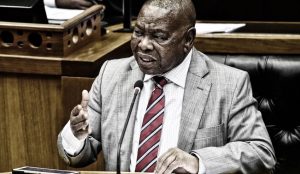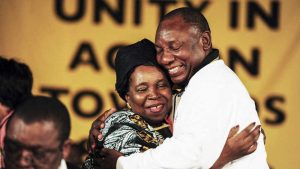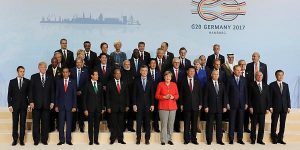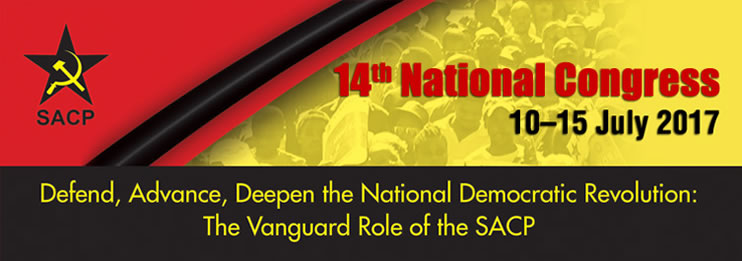
SACP Gen Secretary, Blade Nzimande
The electoral road to power will witness a crack traveler on the track soon should the South African Communist Party, (SACP) make good its threat to quit alliance with the African National Congress, (ANC) and the Congress of South African Trade Unions, (COSATU) so as to seek state power. It has said so before but never carried out the threat. Even now, it still has no idea when it would enter the electoral arena independently although the issue, as far as observers can see, is not when it actually does but the possibilities and unintended but positive consequences that doing so could unfold, much, much beyond South Africa and irrespective of whether it wins or not.
In a global context in which a Bernie Sanders with socialist claims became an electoral figure in the United States, where the labour party in Britain has put up a very impressive show to Tory’s chagrin and where China is on the move in global power term, the South African Communist Party seeking power would unsettle the propaganda that communism is dead. The domino effect may have a liberatory effect on African politics in a transformative direction favouring rapid industrialisation and national independence within the context of globalisation.
According to The Mail and Guardian, the Communist Party’s decision followed a week of deliberations although it hints the unlikelihood of this being possible in the 2019 elections. But it is embarking on what the paper describes as the exact modality in which SACP would do so in terms of “concrete analysis and through the process of active engagement with worker and progressive formations”, quoting Chris Matlhako, the Second Deputy General Secretary of the party who presented the declarations of the congress. Matlhako is also reported as saying they have not engaged COSATU with which it is in the triple alliance made up of the two others – COSATU and the ANC.

Dlamini Zuma or Cyril Ramaphosa: Only Africa’s ancestors can decide who of these two is most fit to rule South Africa next. So far, they are the two top contenders from the ANC stable
The Mail & Guardian stated that it has understood that informal discussions have begun between the SACP, trade unions and ANC veterans for the formation of an alternative movement if the ANC elects Nkosazana Dlamini-Zuma as president in December. And that Cyril Ramaphosa, the incumbent Deputy to President Jacob Zuma is scheduled to lead the new group. The paper also reported that delegates to the national congress of the South African Communist Party made a big show of the song “Le utliwe ditaba tse monate? Hore party ya contesta?” which translates to “have you heard the good news that the party is contesting elections”. It added that the congress alluded to a strong desire by SACP members to contest state power throughout the conference even as the communist party is still expressing faith in the ANC-led alliance, though qualifying the commitment to report back to the ANC on its impending decision by saying to the ruling party that discussion thereto would be that of equals, not of “seniors and juniors”.
Many observers of South African politics within and outside the country would normally say that the best thing would be for the current alliance to remain as it is. An equally good number of observers would, however, add that it is time for African politics to receive a hypodermic jolt in the form of a communist party such as the SACP. That, it is argued, is probably the only way the African elite will realise how precarious the situation on the continent is. There is considerable consensus that the portrait of the continent in Mapping Sub-Saharan Africa’s Future: A US National Intelligence Council Conference Report of 2005 is still the sharpest and most frightening because almost all it speculated are happening. Implicated as the writers of the report in the situation they describe below, it is still a case of almost nothing more to add:
The African state
Most territorially defined African states will continue to exist formally in 2020. While there may be boundary changes in Sudan, Somalia, and a few other places, the legal map of Africa will not change significantly. However, the informal map of power will become more confused. Some African governments will continue to consolidate administrative capabilities and military might and will therefore have substantially more ability to influence their own citizens and neighbors in the next 15 years. Other countries will continue to lose capabilities, largely because of persistent revenue crisis and the ability of non-state actors including NGOs, traditional leaders, insurgents, criminals, and terrorists, to operate in areas where the formal presence of government is limited. These “archipelago states” may constitute the plurality of all countries in Africa as it will be relatively common for the capital informally to cede control over parts of their hinterland, especially since globalization constantly pushes economic activity to the capital, or the few major urban agglomerations.

A group picture of the G20 in which South Africa is the only African country, Nigerian having been removed at the last minute and replaced with the EU because it is thought to suffer from overdose of instability to bring anything to the table. And yet, the G20 is now the most complete aggregation of world powers. What a pity!
A certain number of African states will also essentially be taken over by the international community. While it is doubtful that any African states will become long-term trustees of the United Nations, international supervision of some failed or failing states will become more common and accepted. Those African countries that fail are unlikely to receive significant assistance from international peacekeepers. South Africa and other African militaries have only limited peacekeeping capabilities. While international commitment to peacekeeping is likely to increase, it probably will not keep up with African demand. When foreigners intervene, they are usually best at reconstituting order in the cities. The rural areas in countries that have been “peacekept” tend to remain ungoverned for years. The international community has also found it easier to intervene in small countries, for obvious reasons. Large countries that spiral downward are therefore likely to have especially complicated maps of power where vast areas may be formally ungoverned.
A few aspects of state territoriality will “harden” in the next 15 years. It is likely, for instance, that refugees will find an increasingly hostile reception amongst nominal host governments. Many African governments have learned that conflicts in neighboring countries can drag on for many years and that a commitment to house refugees can be a very long term commitment. Refugees have also been a cause of destabilization in many areas.
Patterns of conflict
Africa was the site of much of the military conflict in the world in the 1990s and there is no reason to believe that its share of world violence will change appreciably in the next 15 years. As in the past, most African conflicts will be internal, although the pattern of outsiders intervening in civil wars, either to help one of the protagonists or to protect themselves from the fallout of the conflict, will continue. African governments and rebels will continue to take advantage of the international market for basic weapons and, increasingly, logistics and higher-order military functions such as aerial reconnaissance. Most African countries will not be able significantly to increase the prowess of their security forces, in good part because of continued low economic growth and the paucity of foreign military assistance.




























